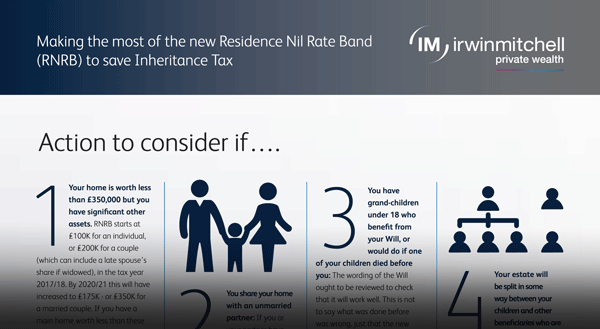
Action to consider if...
1. Your home is worth less than £350,000 but you have significant other assets. RNRB starts at £100K for an individual, or £200K for a couple (which can include a late spouse’s share if widowed), in the tax year 2017/18. By 2020/21 this will have increased to £175K - or £350K for a married couple. If you have a main home worth less than these figures, it is sensible to be aware of the figures in case there are ways of developing the values that may benefit from relief.
2. You share your home with an unmarried partner: If you or your partner have children, there are important elements of the new rules that concern “stepchildren”, the definition of which may not include your partner’s children. So if your wills make provision for both your partner and any children you need to review your wills to see if new provisions are needed.
3. You have grandchildren under 18 who benefit from your will, or would do if one of your children died before you: the wording of the will ought to be reviewed to check that it will work well. This is not to say what was done before was wrong, just that the new rules mean many wills could need changing to
4. You estate will be split in some way between your children and other beneficiaries who are not your descendants The benefits of the new regime, designed for direct descendants, do not extend to sisters, brothers, nephews etc. So if, for example, you were helping out a sister or aunt, it would be sensible to consider how that works for RNRB and whether your will could be changed for the better.
5. You own your home with a trust: Real tax planning or asset protection benefits purposes can be aided by trusts owning all or part of a property. Trusts can still work well with the new RNRB but the ownership and terms of the trust need review, to ensure the new relief is used effectively. So do take legal advice, and note that some forms of trust may need to be reviewed during the lifetime of a beneficiary.
6. Your Will includes a Discretionary Trust: Trusts which give a wide discretion as to who benefits have great value and are often included in wills, or deeds of variation after someone dies, in two main ways:
a. Nil Rate Band Discretionary Trusts can be of great benefit in maximising the tax saving between the estates of married couples. Any will with such an arrangement should now be reviewed, alongside consideration of the value of your assets, as some changes may be appropriate –though many will not need changing.
b. Discretionary Trusts of the residue of your estate are often designed for flexibility, rather than tax planning, to allow the trustees to see how everyone is placed when the person dies. Changes can then be made to reflect circumstances, for example if one fo the family is getting divorced or having serious money problems. A review now may help identity how this might work, with the new regime, but a new letter of wishes would help, and perhaps a change to the will.
7. You have two properties that are, or were, a residence for you; whether owned by you or a trust. You might have more than two but having more than one raises a few different issues, including for some people the potential to secure greater benefits. So it is worth reviewing the values, and the ownership of each, with a lawyer who understands the tax issues.
8. You have a mortgage on your home, the net value is less than £350K, but you have other assets. RNRB looks ta the net value of properties and in some cases it may be worth using any spare cash or investments to repay part of the mortgage to secure maximum relief.
9. You have sold your home since 7 July 2015, to move to a less valuable home New “downsizing” provisions may apply, if your new home has a value below the tax exempt amount, so it’s worth checking the figures with an adviser and then if needed to keep relevant documents about the property you sold.
10. You sold your last home, since July 2015, to live in rented accommodation or a care home To secure the downsizing addition, do take advice on what documents you need to keep, to ensure you can prove your claim when the time comes.
11. You are married and the value of your combined assets is over £2 million. It’s worth taking advice about your will and the use of your assets in your lifetime. There may be steps to take, including the arrangement between the two of you when one dies, to get the best out of RNRB. The marginal rate of Inheritance Tax on assets over £2m will be 60% -a tax charge worth avoiding!
12. You have been widowed and have remarried: You may have the potential to secure additional tax free allowances. A widowed person can have two RNRBs, amounting to £200K at first (£350K in 2020/21) and if a married couple have both been widowed before they remarried, they may be able to get 4 RNRBs!
There are many hurdles to overcome, traps to avoid. These require advice from lawyers who understand the complex new rules. We would be pleased to help you, explore the advice you might need, and the potential cost of the advice. It would be wrong to assume that relief will be given in any event.
Kelly Greig, Partner
Download as a pdf
Published: 3 April 2017
A moment of clarity
April 2017
For general enquiries
0808 291 3524
Or we can call you back at a time of your choice
Phone lines are open 24/7, 365 days a year

